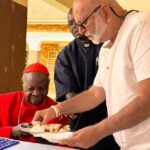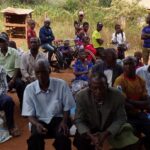The spectacle of humility displayed on Thursday, 31 March 2022, at Bulange requires comment and scrutiny. We need to know where we all stand.
We need to know if this is an act of cynical beguilement or not. If so, and there is every chance that it is, then it must be extremely criticized so as to redirect the spotlight, firmly and constantly, on our cherished constitutional values.
It is now generally accepted that, in his intemperate and ethnically divisive remarks at a vigil for the deceased Speaker of the Eleventh Parliament, Jacob Oulanyah, last week, Chief Justice Alphonse Chigamoy Owiny-Dollo fell short of the standards of decorum expected of a person occupying high public office.
His reaction has been first to deliver a non-apology apology published in the Daily Monitor of March 29, and then stage a joint photo-op two days later with the Katikkiro at Bulange, the administrative seat of the Kingdom of Buganda, hoping to beguile Ugandans, but especially the Baganda, into ‘forgetting and moving on’.
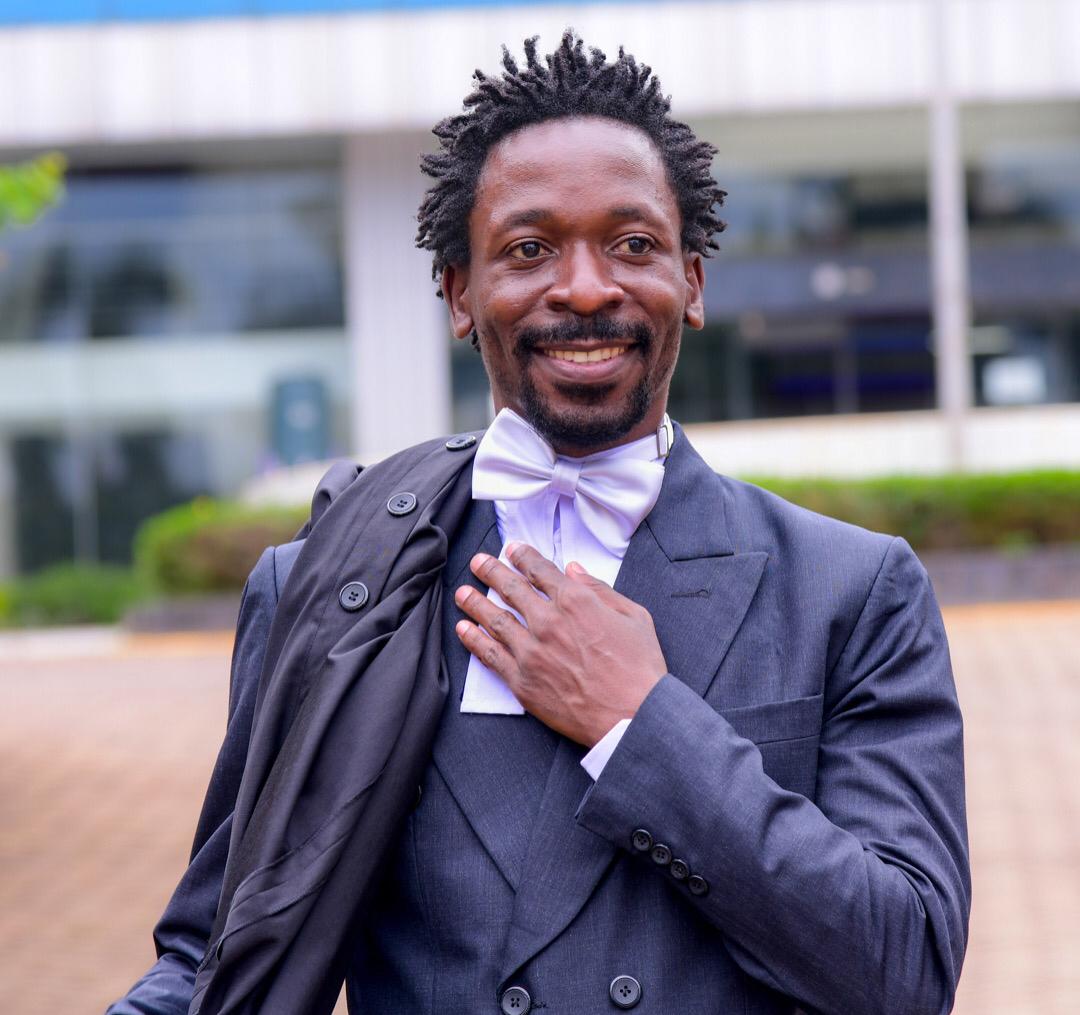
This article calls out CJ Owiny-Dollo over these antics, and demands that his lordship immediately steps aside and submits to a proper investigation of his conduct by the Judicial Service Commission and the police; or he resigns gracefully, to set a concrete example for stately conduct in a functional democracy.
Due to the duties and responsibilities imposed on them by law, judicial officers should show restraint in exercising their freedom of expression in all cases where the authority and impartiality of the Judiciary are likely to be called into question.
In his hate-laced diatribe against Buganda, Baganda, Kabaka and protestors in Uganda and the Diaspora, CJ Owiny-Dollo awfully crossed the line from criticism to crime, contrary to section 41 of the Penal Code Act (promoting sectarianism), and is liable on conviction to imprisonment for a term not exceeding five years.
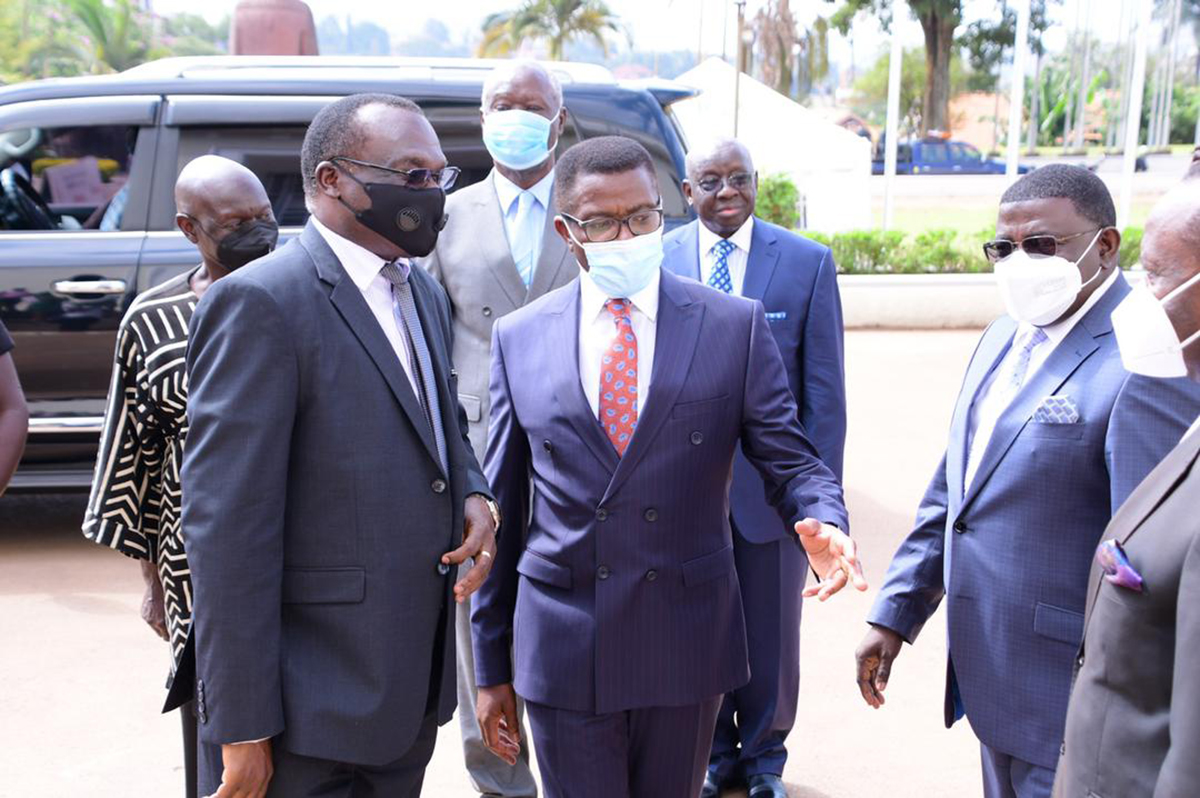
“Oulanyah go back home”
The facts themselves are quite clear: the Chief Justice expressed strong opinions regarding the circumstances surrounding the illness and subsequent death therefrom of his friend, colleague, fellow lawyer, former party comrade and former fellow legislator Oulanyah.
CJ Owiny-Dollo passionately expressed his belief that protests in early February in Seattle, Washington, in the United States of America, by Ugandans in the Diaspora, over the government decision to fly the late Speaker abroad for treatment at great public expense, were an expression of ethnic animosity and hypocrisy by one ethnicity (Baganda), against his and the late Speaker’s own (Acoli).
During this outburst, stealthily recorded using a smart phone at the deceased Speaker’s home in the plush Kampala city suburb of Muyenga, in Kampala, Buganda, on March 22 and posted online the following day by a citizen journalist, the Chief Justice managed to elevate the accusation to involve the personality of the Kabaka of Buganda, and in the process made a false and defamatory allegation about him.
“He was struggling for his life. And what did we see? Fellow Ugandans, holding placards ‘Oulanyah Go Back Home’. That this dying man should go back home. That they have spent taxpayers’ money to charter a plane to take Oulanyah to America,” lamented Owiny-Dollo.
“But you who were demonstrating, your ethnic leader was transported in the presidential jet to Germany using public funds. He was not entitled. You did not demonstrate. Is it because Oulanyah is an Acoli? Is it because he does not speak your language? Only a wicked person can fight a person who is fighting for his life. Only a super-wicked person can fight the dead. Actually for us it is an abomination which has no name.”

More than an error
The Chief Justice heads the Judiciary which is one of the three arms of government, and he ranks number four in the national order of precedence.
Having demonstrably fallen short of the impartiality expected of a person assigned the task of overseeing the dispensation of justice in a nascent constitutional democracy, the implications are several and grave, in relation to the history and possible trajectories of the judicial, constitutional and political futures Uganda may face.
This comes against the backdrop of several previous examples of intemperate conduct by Owiny-Dollo, unbecoming of the holder of the office of Chief Justice.
While presiding over a Supreme Court session in which lawyers acting for National Unity Platform (NUP) leader Robert Kyagulanyi were seeking to present additional affidavits to support his election petition challenging the results, as declared, of the 2021 Presidential Election, CJ Owiny-Dollo was caught live on camera saying that he and court ‘did not invite anyone to file the suit’.
“We all came to this court at will,” Owiny-Dollo said. “We did not invite anybody to file the petition. If you feel you are not happy with the court proceedings, please feel free with using your Plan B but do not be contemptuous of the courts,” he added.
The first problem with this was that the “Plan B”, to which the Chief Justice referred so disparagingly, was a statement made by another opposition political figure, and not Robert Kyagulanyi, whose petition was being considered.
The second problem was that “Plan B” was a statement that had not been made within the purview of the court, and so was quite irrelevant to the proceedings, and doubly so, since it was being misattributed.
Subsequently, a female colleague on the Coram that was presiding over the same election petition, addressed the media, visibly distressed and humiliated, to complain that she had been harassed by CJ Owiny-Dollo.
The details of that occupational harassment complaint are already before the Judiciary ombudsman.
Then on 4 February, at a televised function to mark the commencement of the Law Year, CJ Owiny-Dollo rushed to amplify the arbitrary censure of select court users, including myself, who had been condemned, by a kangaroo court during the 23rd annual judges and registrars conference, of the offence of ‘cyber bullying’.
No one would have expected an openly fascist posture from the Chief Justice.

Deeper problems
However, those are the strictly technical aspects of the problem. There are deeper problems of meaning and intent.
We can begin with the original statements that emerged voluntarily from the Chief Justice, which he now says were made while in an emotional state.
After these, we can look again at the substance of the apology which he subsequently issued, presumably in a sober state. In it, the Chief Justice seeks to further parse his statements.
“I stand firm in my castigation of those who mercilessly tormented Jacob Oulanyah at the time he needed compassion most; and, who continue to inexplicably dance on his grave. I reiterate that this contravenes our much-cherished African culture, and it must be condemned by all people of good will,” CJ Owiny-Dollo said.
At Bulange, the Chief Justice was conspicuously silent about this attitude.
The effect of this has been to separate the matter of any offence caused to the Kabaka, from the more general attacks on the presumed subjects of the Kabaka.
In short, the Chief Justice holds fast to two key points: (1) that the demonstrations in Seattle should not have been held, and (2) that the reasons given for the demonstrations hid the real reasons, which were reasons of ‘ethnic’ or ‘tribal’ hostility.
This is very problematic, and disturbing.
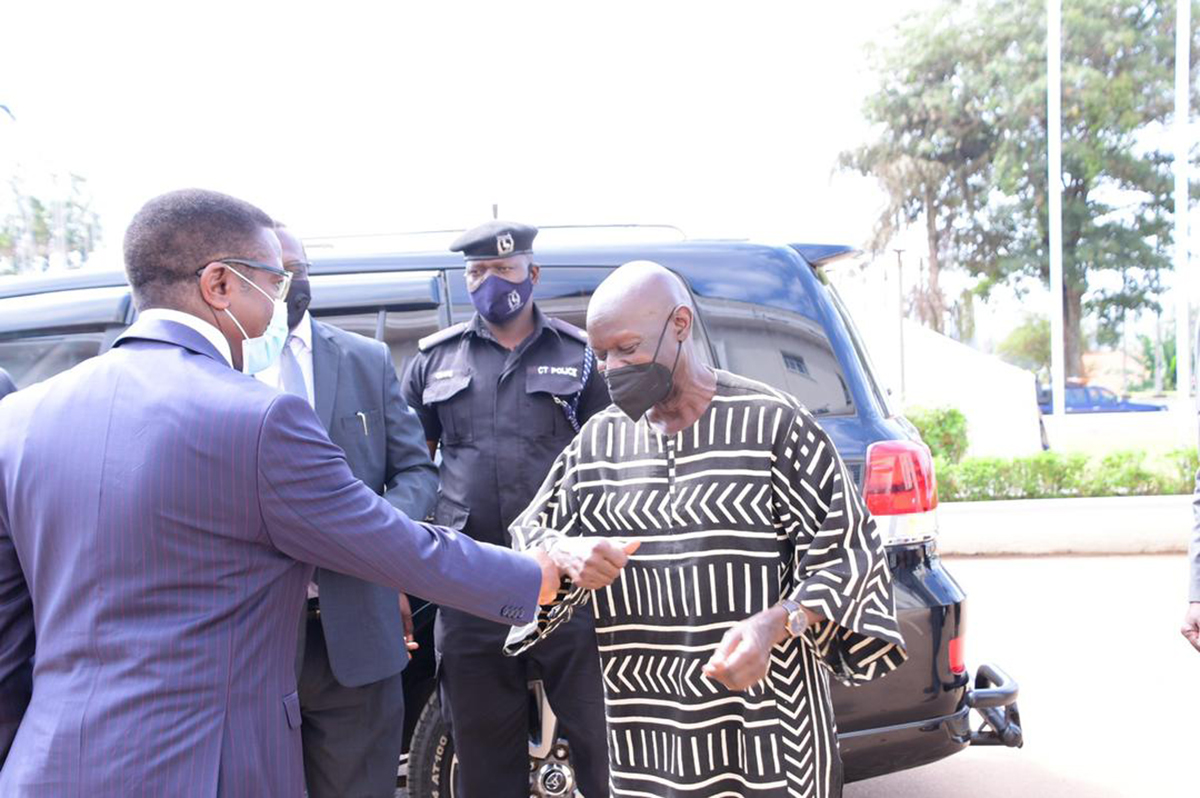
Stifling freedom
Freedom of Assembly is a human right enshrined in the 1948 United Nations Universal Declaration on Human Rights, and 1966 International Covenant for Civil and Political Rights, to which Uganda is a signatory. It is therefore also incorporated in the 1995 Constitution of the Republic of Uganda.
What is more, this freedom is interconnected with freedom of expression and covers the holding of any manner of peaceful demonstration, and not simply about those topics that do not offend, shock or disturb powerful individuals, or the state.
There should not be an iota of doubt, or equivocation regarding this matter, not least by a custodian of the Constitution. Peaceful demonstrations are an unchallengeable citizen’s right, whether wicked or not, whether callous or not, and whether inside or outside the country.
If his lordship felt impelled to proffer a judicial opinion on the demonstrations in Seattle, it was incumbent on CJ Owiny-Dollo, as our chief human rights brand ambassador, to remind mourners at the Speaker’s vigil in Muyenga about the hallmarks of a democratic society: pluralism, tolerance and broadmindedness.
Instead, like a disgruntled Prince Hamlet, Owiny-Dollo retreated to the undemocratic and fictitious notion of a general, unitary intelligence that presumably bans ‘wicked and callous acts’ like protesting against ‘a person who is fighting for his life, or is dead’.
In the landmark Supreme Court case of Onyango Obbo v. Attorney General (2004), it was affirmed that restrictions on freedom of expression enshrined in traditional, religious or other such customary law are unconstitutional.
Accordingly, by invoking ‘African culture’ to condemn protests spotlighting the Speaker’s very expensive medical care, CJ Owiny-Dollo was speaking out of turn.
Unfortunately, since it was the fourth eulogizing the third in the national order of precedence, many people believe that the Chief Justice’s blatantly unconstitutional remarks broadcast from Muyenga to be the law regarding the right to protest.
CJ Owiny-Dollo has therefore unlawfully endorsed a further restriction of our civic space, thereby gifting the notorious law enforcement agencies of the military dictatorship yet another blunt instrument with which to molest, maim and kill Ugandan protestors.
It is not yet clear what was said behind closed doors at Bulange.
But the hushed apology, if any were delivered with respect to our political and civil liberties, is simply not enough to undo the damage left on the national psyche by the loud, seductive yet unconstitutional statements of Owiny-Dollo at Muyenga.

Ethnic profiling
The second indiscretion flows from the first.
In attributing motives to the demonstration other than the ones declared by the demonstrators themselves, CJ Owiny-Dollo not only doubled down on his stance of hostility to Freedom of Assembly per se, but also ventured into the prohibited territory of ‘racial’, ‘ethnic’ or ‘tribal’ profiling, policing and punishment.
Supposing, for the sake of argument, every single one of the individuals involved in the Seattle demonstration had in fact been from the ethnic group CJ Owiny-Dollo alleged, and still seems to be insisting upon, would the demonstration have been any less legal? The real issue to therefore focus on is the Chief Justice’s demonstrated opprobrium towards a particular ethnicity.
Having found it difficult to maintain his obnoxious accusation at an official level in Buganda by tying it to the person and office of the Kabaka, the Chief Justice has nevertheless sought to salvage his argument, in a published nonpology, by still misattributing identity and motive to the supporters of the protest in Seattle.
According to CJ Owiny-Dollo’s repugnant diatribe, the supporters of the Seattle demo were all Baganda, and members of Mr Kyagulanyi’s political party (NUP). They should be ‘castigated’ as ‘evil’ for having ‘mercilessly tormented Jacob Oulanyah (RIP)’ because he hailed from Acoli, and did not speak Luganda.
In his backhanded apology, the Chief Justice intensified the sabre-rattling, re-echoing the demagogic war cries of his kinfolk Nobert Mao’s “One Man Army”.
He issued a thinly veiled ultimatum “to the people of Buganda”—requiring them, in effect, to denounce not only the Seattle protest but activism generally, and “the people who are now seen as representing the views of Buganda”—or else suffer “tragic repercussions” such as the atrocities and “heavy price” inflicted on the people of Acoli by past regimes.
Isn’t it rather curious that CJ Owiny-Dollo fervently exploited the platform of a vigil to dictate the terms of acceptable politics for ‘the people of Buganda’?
Didn’t the Chief Justice cross the line when he publicly declared his political views at the departed Speaker’s vigil, and in the Daily Monitor of 29 March 2022?
Are we supposed to just “forget and move on” from the scandal of CJ Owiny-Dollo’s incitement to inter-ethnic hatred in the wake of Speaker Oulanyah’s death?
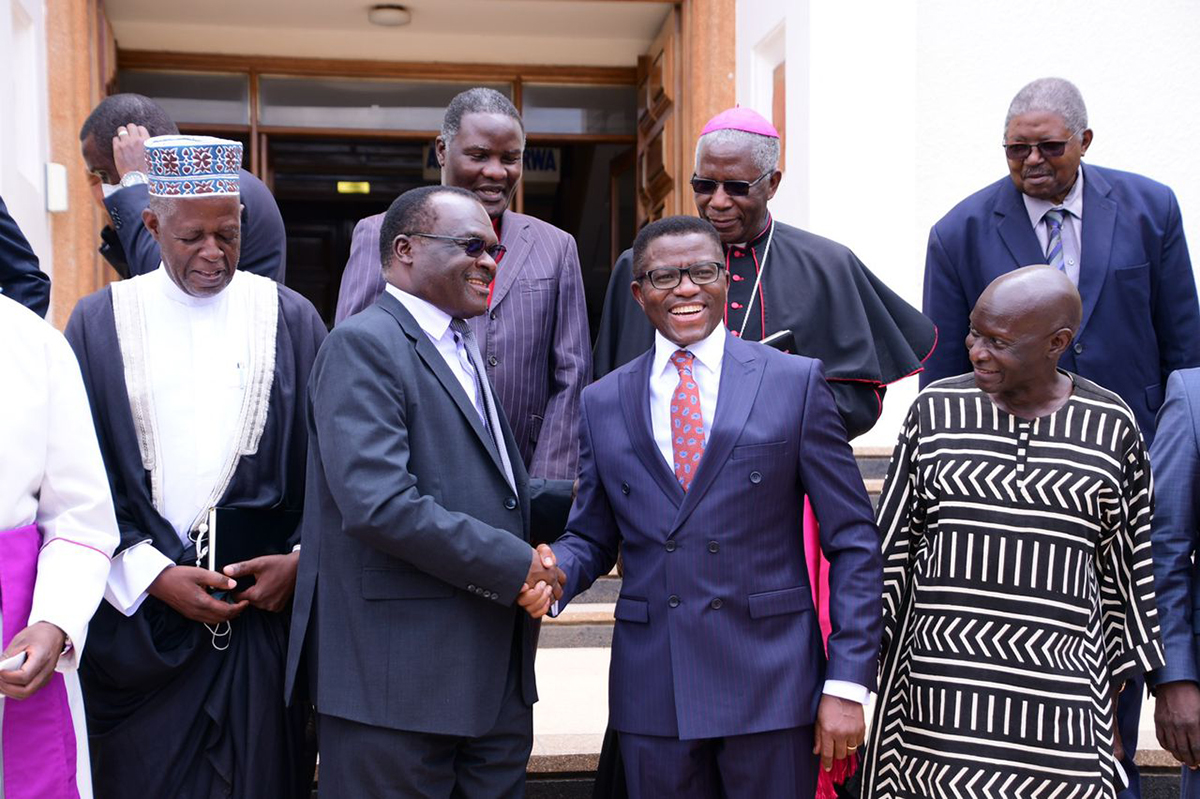
Unremorseful
All this serves to reveal three inconvenient truths about CJ Owiny-Dollo.
First, the Chief Justice is a bitter, hate-filled man.
Based on his statements at the vigil and in the Daily Monitor, one catches a glimpse of the triggers for this deep pain and anger. Perhaps this is from the trauma his people experienced during the war in the north, but it is baffling why he fingers Buganda and/or Baganda for this personal discomfiture or worse.
Imagine the depth of pain and anger that gripped the Chief Justice on March 22 and demobilised his juridical acumen such that he could recklessly spew a blatant lie about the Kabaka of Buganda and his subjects, just to diminish his pain and anger!
On a serious note, the man urgently needs therapy.
CJ Owiny-Dollo’s maiden trip to Bulange was therefore a prime opportunity for Katikkiro Charles Peter Mayiga and the clergy to broaden the discourse about the state of the country’s mental and emotional health at large, instead of simply urging that we “forget and move on” while turning a blind eye to the self-evident truth that Owiny-Dollo suffers from the monster of clinical bitterness which vividly reared its ugly head at the vigil.
Secondly, the Chief Justice continues to hold deep-seated bias and animosity against people of Ganda ethnicity, both individually, and in terms of their political, social and cultural expressions or formations—wherever they are in the world.
CJ Owiny-Dollo may count two daughters of Buganda among his domestic partnerships, and has lived and prospered in Buganda for most of his adult life, but the implicit or hidden bias that was flamboyantly displayed at the vigil cannot be unseen.
The genie is out of the bottle.
Thirdly, the Chief Justice also continues to hold manifest bias and contempt with respect to the constitutional rights of all change-seeking Ugandans to assemble, peacefully demonstrate, and also hold views critical of government or the elite.
Faced with the ultimate test of fidelity to the ideals of democracy, human rights and the rule of law, as exemplified by the Seattle demonstrations, CJ Owiny-Dollo has shown us that he would unhesitatingly abandon these principles in favour of the health, comfort and prosperity of his own kinfolk.
Based on his political statements at the vigil and in the Daily Monitor, CJ Owiny-Dollo is not embarrassed or ashamed of his pro-government bias. For him, the civic struggle for equality, accountability and good governance must yield to the cultural norms and political choices that are convenient for the ruling elite. Period!

Far reaching implications
Combined, these attitudes have far-reaching implications for previous, pending and imminent judicial proceedings associated with the Chief Justice.
The case of the NUP best exemplifies these concerns. It is a party led by a person from Buganda; its symbols featured prominently in the Seattle demonstrations; and it performed well in Buganda region during the last election.
NUP leaders from Buganda therefore fit the classification of people that CJ Owiny-Dollo says we should be ‘wary of’. Can they still expect justice in this country?
But there is also palpable apprehension among civically active Baganda and civic organisations led by people from Buganda (such as Legal Brains Trust, where I am co-founder, CEO and supporter of wicked protests), that our future engagements in civic activism, including public interest litigation, will henceforth be profiled, policed and punished on tribal, ethnic, religious, moral or other capricious considerations during CJ Owiny-Dollo’s tenure, and perhaps even beyond.


Resignation
Thanks to Muyenga and Bulange, the true CJ Owiny-Dollo has been magnified for the world to see. He is now an infamous internet meme for being a hatemonger and fascist, owing to yet another trending video of his misbehaviour as Chief Justice.
In an unguarded moment at Muyenga, his attack on protesters in general, and the Baganda in particular, was pure vitriol. He displayed an undemocratic makeup.
This is a judicial scandal of epic proportions and one for which the obvious humane solution is resignation.
But what is even more shocking is that CJ Owiny-Dollo has failed to voluntarily acknowledge and atone for his shortcomings. He has instead chosen to make light of our collective fear by participating in familiar PR antics.
But will PR help CJ Owiny-Dollo become a better person or leader? Will the insecurities that he masks suddenly disappear because he went with the clergy, a judicial colleague and a former diplomat to Bulange, and saw the Katikkiro?
When leaders refuse to acknowledge their shortcomings, and eschew timely atonement and guarantees of non-repetition, they inexorably hurt the brand and culture of their respective institutions.
Accordingly, we demand that CJ Owiny-Dollo’s sectarianism and fascism should be promptly and properly investigated by Judicial Service Commission and the police, if needs be, and appropriate action taken to preserve the integrity not only of the office of Chief Justice, but also the Judiciary as a whole.
Without prejudice to the official inquiry, we urge CJ Owiny-Dollo to consider delivering—in at least 24 monthly public rallies across Uganda—an unequivocal and unreserved apology that goes beyond the personal injury to the Kabaka, and addresses imperative constitutional values, including the elephant in room: whether he can still be trusted to perform the function of chief brand ambassador of the people’s right to protest in a just, free, democratic, united and progressive society, as enshrined in the Constitution and the known treaties.
Short of that, the ‘ethnic judicial officer, from Acoli’ must resign the high office of Chief Justice of Uganda, or be eternally damned to suffer public ridicule, whilst hurting the reputation of the Judiciary with his opprobrium.
Mr Isaac Ssemakadde hails from Buganda, and is an Advocate of the High Court of Uganda and also CEO, Legal Brains Trust, a Kampala-based democracy and human rights watchdog.
![]()
No related posts.























